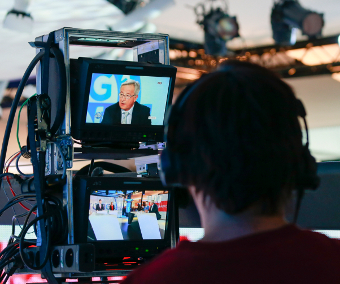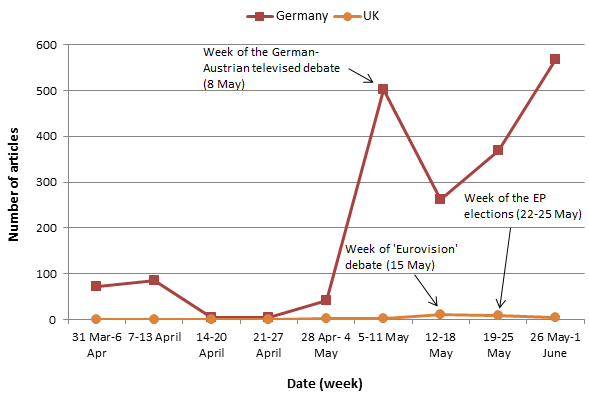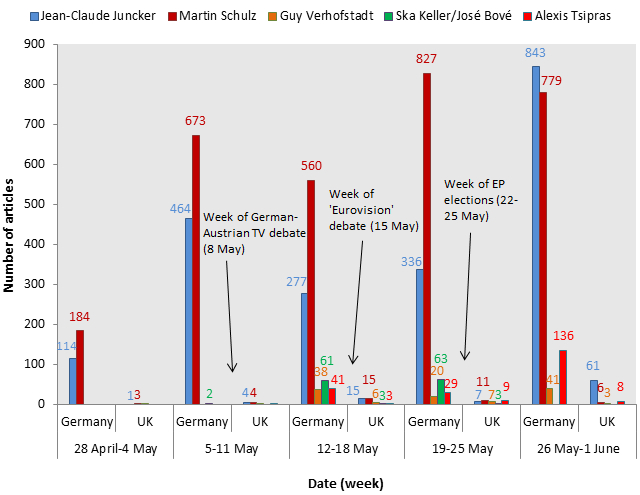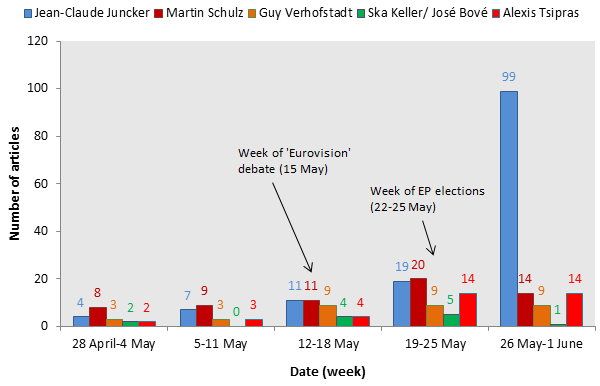The so called ‘Spitzenkandidaten’ process, in which European-level political parties proposed formal candidates for President of the European Commission prior to the European Parliament elections, has been strongly opposed by David Cameron and the British government. This opposition has led to intense disagreement between the UK and other EU states, notably Germany, over whether Jean-Claude Juncker, the candidate for the European People’s Party, should be selected as the next Commission President. Simon Hix and Stuart Wilks-Heeg assess differences in the media coverage of the Commission candidates in the UK and Germany. They illustrate that the candidates received substantially less coverage in the UK press, which may offer one reason for why both countries appear to have completely different understandings of how European Parliament elections should work.
[embedyt]http://www.youtube.com/watch?v=ho2MRJ84-8k[/embedyt]
You would need to be a close follower of EU-politics to have noticed, but a new word has entered the English language (in Europe at least): Spitzenkandidaten (lead candidates). The fact that this is a German word already, and that it has only appeared six times in the UK press so far this year, tells us a lot about how different countries experienced the 2014 European Parliament elections.

Although the European Parliament has been elected in pan-European elections every 5 years since 1979, this was the first time that European-level political parties had proposed rival candidates for the most powerful executive office in the EU – the Commission President – prior to the elections: Jean-Claude Juncker for the centre-right European People’s Party (EPP), Martin Schulz for the Socialists and Democrats, Guy Verhofstadt for the Liberals, Ska Keller and José Bové for the Greens, and Alexis Tsipras for the European Left.
Now the elections are over a battle has emerged between Germany and Britain about who should be the next Commission President. For Merkel and most of the political establishment in Germany it must be Juncker, because his EPP party emerged as the largest group in the new European Parliament. As Der Spiegel declared in an editorial on 3 June: “The EU cannot… refuse to give the people of Europe what was assured to them before the election – that they could use their vote to determine the next president of the European Commission”.
For Cameron and most of the British political establishment, in contrast, the Spitzenkandidaten process should be ignored by the European Council, on the grounds that the heads of government must retain their sovereign right to choose the Commission President: “Block Juncker to Save Democracy”, Gideon Rachman exhorted in The Financial Times.
Why such a different reaction? Part of the answer almost certainly lies in how the German and British media portrayed the campaign between the Spitzenkandidaten. Most fundamentally of all, there was enormous variation in the extent to which media coverage in the two countries made reference to any of the Spitzenkandidaten. In turn, these variations in volumes of media reporting had a major influence in the degree to which voters in both countries were aware of the existence of lead candidates.
Chart 1 illustrates the dramatic contrast between German and UK media coverage. It presents a weekly count (beginning 31 March 2014) of the total number of press reports in each country that cited both “Juncker” and “Schulz”, the rival Spitzenkandidaten nominated by the two largest party groupings (derived from the Library Press Display database which provide comprehensive coverage of the print versions of national and regional titles published in both countries).
As the figure shows, the UK press engaged in virtually no discussion of the two leading candidates in the 8 weeks before the election or in the week after the election. In total, there were only 27 press articles that mentioned both Juncker and Schulz; an average of 3 per week. Over the same period, there were 1,905 articles in the German press that contained the names of these two Spitzenkandidaten. The bulk of this coverage occurred from early May onwards, with a sharp peak in coverage evident from the week commencing 5 May. There was also a second peak in German press reporting in the week after the elections (commencing 26 May). We return to the significance of both of these peaks later in this post.
Chart 1: Number of articles in German and UK press citing both “Juncker” and “Schulz”, weekly from 31 March 2014
Note: Derived from Library Press Display searches.
These contrasts in German and UK press coverage are not limited to the two candidates with the highest profile. Our second chart compares the number of articles published in the two countries in which each individual candidate was named. Again, the figures are presented on a weekly basis but each name has been searched for separately, rather than in combination. In addition, the totals for the two Green candidates have been combined.
Chart 2: Number of articles in German and UK press citing each candidate for EU Commission President by name, weekly from 28 April 2014
Note: Derived from Library Press Display searches.
The absolute dominance of Juncker and Schulz in German press reporting is evident here, as is the contrast in the extent to which each candidate was mentioned in the UK press each week. Yet, the differences in the attention paid to the other Spitzenkandidaten is just as stark. From 12-25 May, Alexis Tsipras, Guy Verhofstadt, and Ska Keller/José Bové received, respectively, 3, 5 and 21 times more exposure in the German than the UK press.
Another telling finding is that the peak period of references to any candidate in the UK press occurred in the week after the elections, when Jean-Claude Juncker was mentioned 61 times. This pattern is shown more clearly in our third chart, which documents just the number of UK press reports making mention of each candidate over the same period. Here we have used the Lexis Library database, which has the advantage of including all web-published content. Consequently, the number of name citations for each candidate is slightly higher than in the previous chart.
Chart 3: Number of articles in UK press (national and regional) citing each candidate for EU Commission President by name, weekly from 28 April 2014
Note: Figures derived from Lexis Library searches.
Again, the extremely modest amount of coverage of the contest is striking. But, as noted above, what is especially apparent is the huge leap in post-election mentions of Jean-Claude Juncker. This spike is easily explained, as it reflects David Cameron’s efforts to prevent Juncker from becoming Commission President. Similarly, the volume of references to both Juncker and Schulz in the German press from 26 May-1 June is largely a product of political and journalistic reaction to Cameron’s attempts to overturn the outcome of the Spitzenkandidaten process.
A further important observation should be made about the surge in German press coverage of the rivalSpitzenkandidaten in the week commencing 5 May. This was the week during which the third of the seven televised Spitzenkandidaten debates, in this instance in German, was transmitted by public broadcasters in Germany and Austria. While none of the debates secured large audiences, a survey by the German-based pollsters AMR estimated that 18 per cent of Germans had watched at least part of one debate; the fourth highest figure among the 15 countries where polling was carried out. Moreover, these viewing figures and the associated press coverage were clearly instrumental in raising popular awareness of theSpitzenkandidaten in Germany, particularly in comparison to the UK.
As the next chart shows, compiled using the headline national-level figures from the AMR survey, there was a strong correlation between viewing of the television debates and the ability to name at least one of the candidates unaided. In Luxembourg, where 36 per cent said they had watched at least some televised debate, more than half could name one of the candidates. In the UK, in contrast, where 7 per cent claimed to have watched a debate (a figure which seems questionably high), only 1 per cent could name any of the candidates. Clearly, the extent of, and attention to, media coverage is not the only explanation for the variations presented here. Tellingly, the three countries which appear furthest above the regression line (Luxembourg, Belgium and Germany) are also the nationalities of the individual candidates: Juncker is Luxembourgeois, Verhofstadt is Belgian, and both Schulz and Keller are German (the comparably lower proportion of Greeks able to name a candidate is, however, puzzling given the profile of Alexis Tsipras).
Chart 4: Scatterplot of relationship between viewing of televised Spitzenkandidaten debates and public awareness of candidates’ names
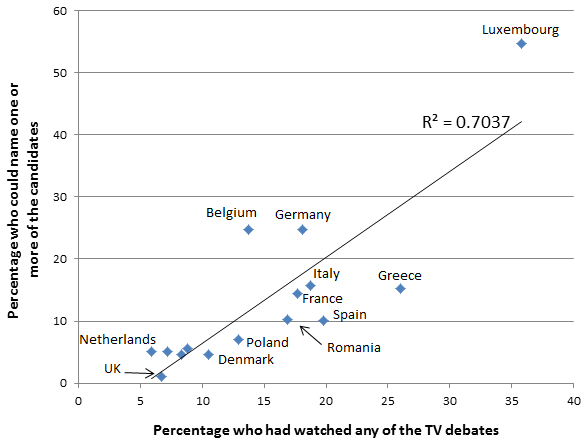 Note: Data from AMR survey.
Note: Data from AMR survey.
Battles between governments over the interpretation of the Treaty are reasonably common in EU politics. But what is perhaps surprising this time – and more worrying for the future of the EU and Anglo-German relations – is how the media in Germany and the UK have taken completely different views of the process. The different level of media coverage of the campaign for the Commission President is one of the main reasons why German and British voters and the political elites in Berlin and Paris have a completely different understanding of how European Parliament elections work.
The battle over the Spitzenkandidaten process is not going to be easy to solve. The inherent tension in the design of the EU since its birth – between an emerging democratic federal union and an intergovernmental association – has come to a head. How Merkel, Cameron and co. resolve this tension could shape the future of Europe and Britain’s relationship with the rest of the Continent for decades to come.
Article by Simon Hix – LSE Government & Stuart Wilks-Heeg – University of Liverpool
About the authors
 Simon Hix – LSE Government
Simon Hix – LSE Government
Simon Hix is Professor of European and Comparative Politics and Head of the LSE’s Department of Government. He is co-editor of the journal European Union Politics. He has held visiting appointments at UC Berkeley, Stanford, UC San Diego, Sciences-Po Paris, and the Hertie School of Governance in Berlin. He regular gives evidence to the committees in the European Parliament and the European affairs committees in the House of Lords and House of Commons. He has written several books on the EU and comparative politics, including “What’s Wrong With the EU and How to Fix It” (Polity, 2008). Simon is also a Fellow of the British Academy.
 Stuart Wilks-Heeg – University of Liverpool
Stuart Wilks-Heeg – University of Liverpool
Stuart Wilks-Heeg is Senior Lecturer in Social Policy at the University of Liverpool. He is recognised as a leading expert on the UK democratic process, particularly with regard to issues associated with the mechanics of the electoral process. Stuart frequently provides UK political commentary and analysis for newspapers and broadcasters regionally, nationally and internationally. He also contributes to a range of leading political blogs, and tweets on UK politics @stuartwilksheeg

